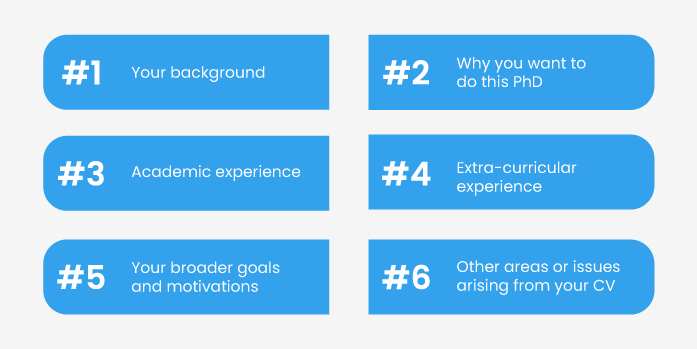In general, your PhD statement should cover the following topics:
1. What is your background?
Keep this relevant (and fairly brief). Admissions tutors and supervisors will be interested in what’s brought you to choose a PhD, but they won’t need to know your life story (and you won’t have time to tell it to them).
If your interest in your subject was inspired in childhood, feel free to say so. But focus on the interest, not the childhood.
2. Why do you want to research this topic?
Every personal statement needs to explain your motivation for taking on a PhD, but what you include here will depend on the kind of PhD you want to take on.
If you’re also submitting a separate research proposal you should probably focus more on why you want to research a PhD than the specific topic you’re proposing to research (that, after all, is what your research proposal is for).
If you’re applying for an advertised project (and not proposing your own research) you should say something about your interest in that PhD: what interests you about it and what you can bring to it.
3. What academic experience do you have?
Your personal statement isn’t a CV, so avoid simply listing qualifications you’ve detailed elsewhere in your application (on your CV, for example).
But your personal statement is a chance to comment on your CV and explain the significance of those qualifications for your PhD application. This is vital if you want to stand out from the crowd.
Most PhD applicants are academically excellent. Be proud of your own results, but explain what those degrees (including specific units and dissertation projects) taught you about the subject you now want to research.
4. What extra-curricular experience do you have?
Another way to build upon your academic qualifications is to include other experience that has also demonstrated (or developed) relevant skills for your PhD.
Again, relevance is key. You may also wish to include one or two examples of your wider experience and achievements, but the focus should be on your suitability for PhD study.
Examples of your character and qualities may be relevant for some projects – particularly those with a charitable focus, human-interest angle or clear social benefits / outcomes. Otherwise, try to stick to relevant skills such as organisation, independent project management, self-motivation, etc.
5. What are your broader goals and motivations?
It’s a good idea to say something about how this PhD fits into your wider aims and career goals.
The specifics of what you plan to do after your doctorate may not matter to your admissions tutors, but the fact that you have plans and can show that a PhD fits them demonstrates that you’ve thought seriously about a doctorate and are likely to commit to overcoming the challenges it involves.
6. Are there any other areas or issues arising from your CV?
Your personal statement is a great opportunity to expand upon your CV.
That could mean providing more detail about academic degrees (as above). But it can also mean explaining any gaps or irregularities and anticipating some of the questions they might raise.
Perhaps you didn’t do as well as you hoped on your undergraduate degree, but went on to find your niche and succeed with a more specialised Masters. It’s OK to acknowledge and explain that if so – particularly if your Masters relates closely to your PhD.
Similarly, if there’s a gap in your CV, it’s better to explain it than leave any begged questions – particularly if there’s a perfectly good reason why you weren’t working or studying at that point.

 Continue with Facebook
Continue with Facebook






